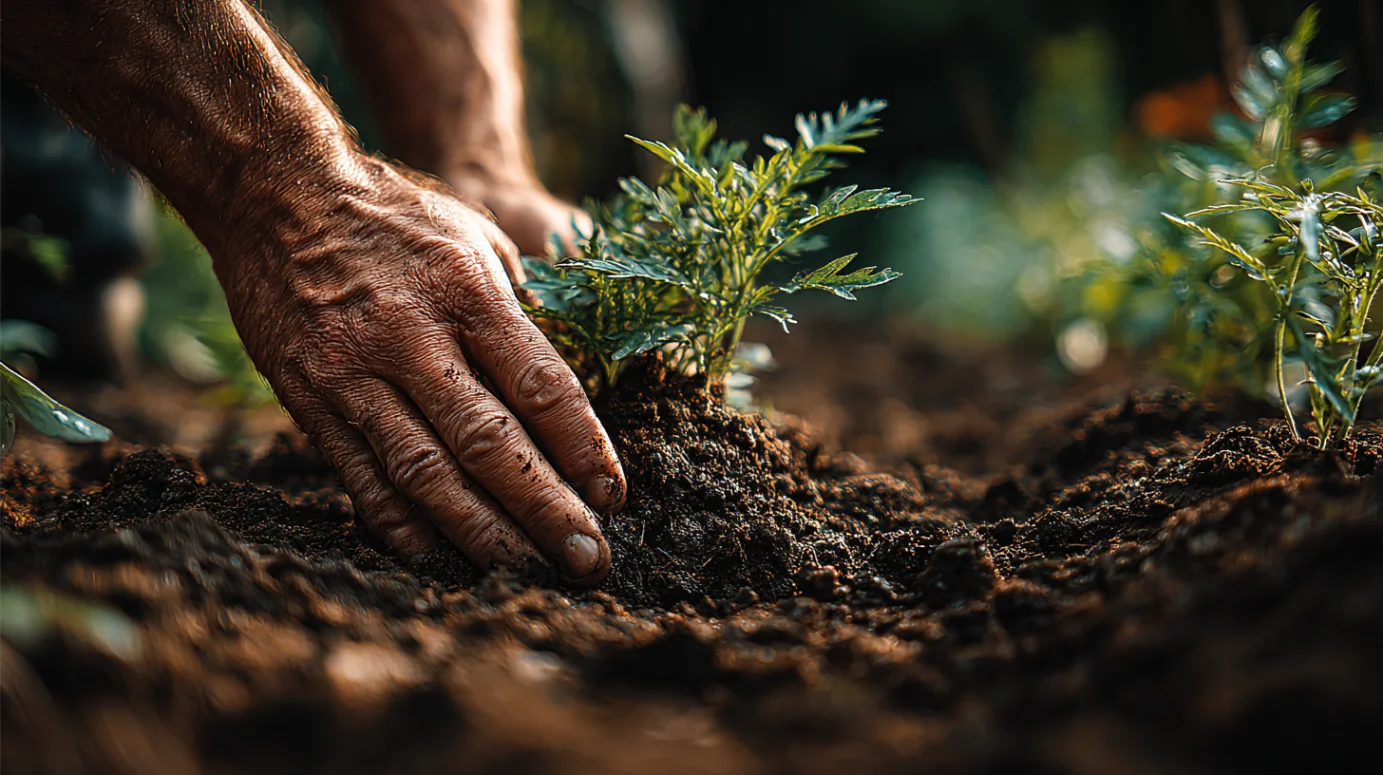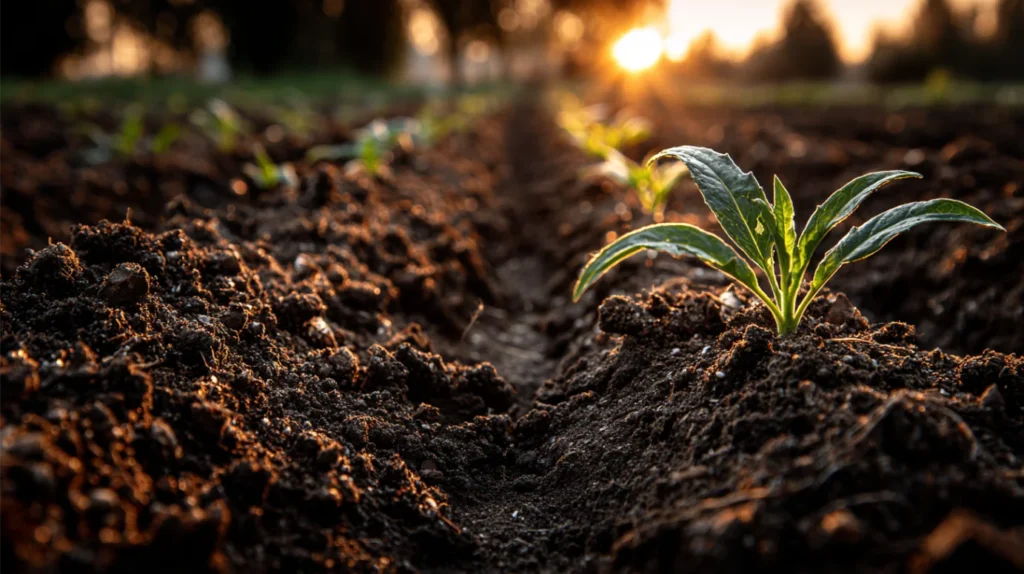
In the rich tapestry of spiritual metaphors that have guided humanity throughout the ages, few images are as powerful and enduring as that of soil. From ancient parables to modern spiritual teachings, the concept of “good soil” has served as a profound symbol for the human heart, mind, and soul—representing our capacity to receive, nurture, and manifest spiritual truths in our lives.
Understanding the Foundation: What Makes Soil “Good”?
Before we delve into the spiritual dimensions, it’s essential to understand what characterizes good soil in the physical realm. Good soil possesses several key qualities: it’s well-draining yet moisture-retentive, rich in nutrients, properly aerated, and maintains the right pH balance. It’s free from toxins and compaction, allowing roots to penetrate deeply and spread widely. Most importantly, good soil is alive—teeming with beneficial microorganisms that break down organic matter and make nutrients available to plants.
These physical characteristics translate beautifully into spiritual metaphors. Just as plants need good soil to thrive, our spiritual lives require the right internal conditions to flourish. The quality of our inner soil determines whether spiritual seeds can take root, grow, and bear fruit in our lives.
The Biblical Foundation: The Parable of the Sower

The most well-known spiritual reference to soil comes from Jesus’ Parable of the Sower, found in the Gospels of Matthew, Mark, and Luke. In this teaching, a sower scatters seeds that fall on four different types of ground: the path, rocky ground, thorny ground, and good soil. Only the seeds that fall on good soil produce a harvest.
Jesus explained that the seed represents the word of God or spiritual truth, while the different soils represent the various conditions of the human heart. The good soil represents those who “hear the word and understand it” and “bear fruit”—producing thirty, sixty, or even a hundredfold return.
This parable establishes the fundamental spiritual principle that our inner condition determines our spiritual receptivity and productivity. The quality of our heart-soil directly impacts our ability to receive, process, and manifest spiritual wisdom in our daily lives.
Characteristics of Spiritually Good Soil
Receptivity and Openness
Good spiritual soil begins with receptivity—an openness to receive new insights, wisdom, and experiences. This quality requires humility, acknowledging that we don’t have all the answers and maintaining a beginner’s mind even as we grow in spiritual maturity. Receptive soil is soft and pliable, not hardened by cynicism, pride, or past disappointments.
Cultivating receptivity involves regular practices that keep our hearts tender and our minds open. This might include meditation, prayer, contemplative reading, or spending time in nature. It also requires releasing the need to control outcomes and trusting in the wisdom of the spiritual process.
Depth and Rootedness
Just as plants need deep soil to develop strong root systems, spiritual growth requires depth of character and commitment. Shallow soil produces shallow faith—spiritual enthusiasm that withers at the first sign of difficulty or challenge. Good spiritual soil has been cultivated over time, creating space for deep roots to form.
Developing spiritual depth involves consistent practice, study, and reflection. It means going beyond surface-level spirituality to grapple with life’s deeper questions and challenges. This depth provides stability during storms and access to the deeper waters of wisdom and compassion.
Proper Drainage and Flow
Good soil allows water to flow through it without becoming waterlogged. Spiritually, this represents our ability to receive insights and experiences without becoming attached or overwhelmed. We learn to hold spiritual truths lightly, allowing them to nourish us without creating stagnation or spiritual pride.
This quality involves developing emotional and mental flexibility—the ability to let go of outdated beliefs, release painful experiences, and remain fluid in our understanding. It’s about finding the balance between receiving spiritual nourishment and maintaining healthy boundaries.
Rich in Nutrients
Spiritually rich soil has been enriched with the nutrients of wisdom, compassion, and understanding. These nutrients come from various sources: sacred texts, spiritual teachers, life experiences, relationships, and inner contemplation. Good spiritual soil actively seeks out these nourishing influences and integrates them into its foundation.
Building spiritual nutrition requires intentional effort to expose ourselves to uplifting and wisdom-bearing influences while limiting exposure to toxic or depleting energies. It involves feeding our souls with beauty, truth, and goodness in all their forms.
Balanced pH
In agriculture, pH balance is crucial for nutrient absorption. Spiritually, this represents emotional and mental balance—neither too acidic with negativity and criticism nor too alkaline with unrealistic optimism. Good spiritual soil maintains a healthy equilibrium that allows for honest self-reflection while nurturing hope and possibility.
Achieving spiritual pH balance involves developing emotional intelligence, practicing self-awareness, and learning to respond rather than react to life’s challenges. It’s about finding the middle way between extremes and maintaining inner harmony.
Cultivating Good Spiritual Soil
Clearing and Preparation
Just as a gardener must clear weeds and debris before planting, spiritual soil preparation involves removing obstacles to growth. This might include releasing resentments, healing past wounds, breaking negative thought patterns, or eliminating toxic relationships and habits.
The clearing process often involves honest self-examination and sometimes requires professional help or spiritual guidance. It’s about creating space for new growth by removing what no longer serves our highest good.
Adding Organic Matter
Compost enriches physical soil, and spiritual practices enrich our inner soil. Regular meditation, prayer, study, service, and contemplation add “organic matter” to our spiritual foundation. These practices break down over time, creating rich humus that supports continued growth.
The key is consistency rather than intensity. Daily spiritual practices, even if brief, are more valuable than sporadic intensive efforts. Like composting, spiritual development is a slow, natural process that requires patience and trust.
Aeration and Cultivation
Soil needs regular cultivation to prevent compaction and ensure adequate airflow. Spiritually, this involves questioning our assumptions, examining our beliefs, and remaining open to new perspectives. It means not allowing our spiritual understanding to become rigid or stagnant.
Spiritual aeration might involve engaging with different wisdom traditions, seeking diverse perspectives, or challenging ourselves with new spiritual practices. The goal is to keep our understanding fresh and dynamic rather than fixed and dogmatic.
Protection from Pests and Disease
Good soil management includes protecting against harmful influences. Spiritually, this means developing discernment about what we allow into our consciousness. It involves setting boundaries with negative influences while remaining open to constructive feedback and growth opportunities.
This protection isn’t about isolation but rather about conscious choice. We learn to discern between influences that support our spiritual growth and those that hinder it, making decisions that honor our spiritual well-being.
The Fruits of Good Spiritual Soil
Inner Peace and Contentment
When our spiritual soil is healthy, we naturally develop greater inner peace and contentment. This isn’t a superficial happiness dependent on external circumstances but a deep sense of well-being rooted in spiritual understanding and connection.
This peace becomes a foundation from which we can navigate life’s challenges with greater equanimity and respond to difficulties with wisdom rather than reactivity.
Compassion and Service
Good spiritual soil naturally produces the fruit of compassion. As we develop spiritually, we become more aware of our interconnection with all life and feel called to serve others’ well-being. This service flows naturally from our spiritual abundance rather than from obligation or guilt.
The compassion that grows from good spiritual soil is sustainable because it’s rooted in understanding rather than mere emotion. It includes self-compassion as well as care for others.
Wisdom and Discernment
Healthy spiritual soil produces the fruit of wisdom—the ability to see clearly, make good decisions, and understand the deeper patterns of life. This wisdom goes beyond mere knowledge to include practical understanding of how to live well.
Discernment allows us to distinguish between truth and illusion, between what serves our highest good and what doesn’t. It’s a practical wisdom that guides daily decisions and long-term life direction.
Creative Expression
Spiritual growth often manifests as increased creativity and self-expression. Good spiritual soil provides the foundation for authentic creative expression that serves not just personal fulfillment but also contributes to the greater good.
This creativity might manifest in traditional artistic pursuits or in creative approaches to relationships, work, and daily life. It’s about bringing our unique gifts and perspectives into the world.
Maintaining Spiritual Soil Health
Seasonal Awareness
Just as physical soil goes through seasonal cycles, our spiritual soil also experiences seasons of planting, growth, harvest, and rest. Understanding these cycles helps us work with rather than against our natural spiritual rhythms.
Sometimes we’re in a season of intensive growth and learning; other times we need to rest and integrate what we’ve learned. Honoring these natural cycles prevents spiritual burnout and supports sustainable development.
Regular Assessment
Good gardeners regularly test their soil to monitor its health and adjust their care accordingly. Similarly, we benefit from regular spiritual self-assessment—examining our inner state, our responses to life events, and the fruits our spiritual practice is producing.
This assessment helps us identify areas that need attention and adjust our spiritual practices accordingly. It’s about maintaining awareness of our spiritual condition and taking corrective action when needed.
Community and Support
While spiritual growth is ultimately personal, it’s supported by community. Good spiritual soil benefits from the presence of other spiritually minded individuals who provide encouragement, accountability, and shared wisdom.
This community might include formal spiritual groups, informal study circles, mentors, or spiritual friends. The key is finding relationships that support and challenge our spiritual development.
Continued Learning
Spiritual soil health requires ongoing nourishment through continued learning and growth. This involves staying curious, seeking new insights, and remaining open to deeper understanding throughout our lives.
The learning never stops because spiritual reality is infinite and multifaceted. Each stage of life brings new opportunities for growth and deeper understanding.
Conclusion: The Ongoing Journey
The spiritual meaning of good soil reminds us that spiritual growth is both a natural process and one that requires our conscious participation. Like a gardener tending their plot, we must actively cultivate the conditions that support our spiritual development while trusting in the inherent wisdom of the growth process.
The metaphor of good soil teaches us that spiritual development is not about forcing outcomes but about creating the right conditions for natural growth to occur. It’s about patience, consistency, and trust in the process. When we tend our spiritual soil with care and attention, we create the foundation for a life of meaning, purpose, and authentic spiritual expression.
The journey of cultivating good spiritual soil is lifelong, requiring ongoing attention and care. But the rewards—inner peace, wisdom, compassion, and authentic self-expression—make this cultivation one of the most worthwhile endeavors we can undertake. As we tend our inner soil, we not only benefit ourselves but also contribute to the spiritual enrichment of our communities and the world at large.
In tending to our spiritual soil, we participate in the ancient and sacred work of transformation—turning the raw material of human experience into the rich ground from which wisdom, love, and authentic spiritual life can flourish. This is both our privilege and our responsibility as conscious beings seeking to live with meaning and purpose in an interconnected world.





